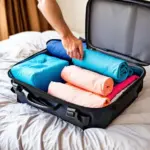Have you ever dreamt of exploring new cities, experiencing diverse cultures, and making a real difference in people’s lives? What if you could combine that wanderlust with your passion for nursing? That’s the exciting reality of being a traveling nurse! Imagine yourself trekking through the vibrant streets of New Orleans one month, then hiking the scenic trails of Yosemite the next, all while using your skills to support hospitals in need.
This comprehensive guide will delve into the world of traveling nurses, answering all your burning questions and revealing how you too can embark on this fulfilling career path.
What Exactly Does a Traveling Nurse Do?
At its core, a traveling nurse’s job is similar to that of a regular registered nurse (RN). They provide direct patient care, administer medications, educate patients and families, and collaborate with other healthcare professionals. The key difference? Traveling nurses accept short-term assignments, typically ranging from 8 to 26 weeks, at hospitals and healthcare facilities across the country.
Why do hospitals need traveling nurses? Staff shortages, seasonal fluctuations, and specialized care demands all contribute to the need for these flexible healthcare heroes. Traveling nurses bridge these gaps, bringing their expertise to locations facing critical needs.
How to Become a Traveling Nurse: Your Step-by-Step Guide
Ready to pack your stethoscope and hit the road? Here’s what you need to do:
1. Obtain Your Nursing License and Experience
The first step is to become a licensed Registered Nurse (RN). This involves graduating from an accredited nursing program and passing the NCLEX-RN exam. Most agencies also require at least 1-2 years of recent experience in a specific specialty, such as critical care, emergency room, or operating room nursing.
2. Partner with a Traveling Nurse Agency
Traveling nurse agencies are your partners in adventure! They connect you with suitable assignments, negotiate your pay and benefits, and handle much of the logistics involved in relocating. Research different agencies, read reviews, and find one that aligns with your career goals and preferences.
Imagine the excitement of receiving your first assignment:
3. Craft a Stellar Resume and Apply for Assignments
Highlight your skills, experience, and desired locations in your resume. Agencies will present you with potential assignments, and you can choose the ones that excite you most! Consider factors like location, hospital type, pay rate, and shift differentials when making your decision.
4. Ace Your Interviews and Secure the Job
Once you’ve found a promising opportunity, prepare for an interview with the hiring manager at the hospital. Be ready to discuss your experience, skills, and why you’re passionate about this particular assignment.
5. Get Ready to Roll!
Once your assignment is confirmed, the agency will assist you with finding housing, arranging travel, and navigating the licensing requirements of your destination state.
Many traveling nurses find that the ability to choose their own assignments gives them a sense of control and flexibility:
Is Traveling Nursing Right for You?
Traveling nursing offers incredible rewards but requires a certain level of adaptability and independence. Ask yourself:
- Am I comfortable with change and adapting to new environments?
- Am I willing to relocate every few months?
- Can I handle the challenges of working in different hospital systems?
If you answered yes to these questions, then this could be your ticket to an exciting and rewarding career!
Benefits of Being a Traveling Nurse
Traveling nursing isn’t just about exploring new places; it comes with a host of personal and professional perks:
- Excellent Earning Potential: Traveling nurses often earn higher salaries than their permanent counterparts, thanks to housing stipends, travel reimbursements, and bonuses.
- Job Security and Flexibility: The demand for qualified nurses is constantly evolving, offering job security and the freedom to choose assignments that align with your career goals.
- Professional Development: Gain diverse experience by working with different patient populations, using various technologies, and adapting to diverse hospital protocols.
- Personal Growth and Adventure: Immerse yourself in new cultures, explore breathtaking landscapes, and create memories that will last a lifetime.
Imagine the adventures you can experience as a travel nurse, like exploring the vibrant city of New Orleans:
Tips for Success as a Traveling Nurse
- Be Organized and Proactive: Stay on top of your paperwork, deadlines, and licensing requirements.
- Embrace Flexibility and Adaptability: Every hospital has unique protocols and procedures. Be open to learning new systems and adapting your approach.
- Build Strong Relationships: Connect with your fellow nurses, doctors, and staff. Building positive relationships can enhance your work experience and lead to valuable connections.
- Practice Self-Care: Traveling can be demanding. Prioritize your well-being by maintaining a healthy work-life balance, exploring your new surroundings, and taking time for yourself.
Travel Nurse FAQs
Q: How much do traveling nurses make?
A: Salaries vary widely depending on location, specialty, experience, and bonuses. However, traveling nurses generally earn a higher hourly rate than staff nurses.
Q: How long are traveling nurse assignments?
A: Assignments typically last between 8 to 26 weeks, with some opportunities for extensions.
Q: Do I need a compact nursing license to be a traveling nurse?
A: A compact license allows you to practice in multiple states with a single license. While beneficial, it’s not always a requirement.
Q: Can I travel with my family as a traveling nurse?
A: Absolutely! Many agencies are happy to accommodate traveling nurses with families.
Discover Your Path with travelcar.edu.vn
Interested in learning more about this exciting career path? Visit TRAVELCAR.edu.vn to explore resources, connect with experienced traveling nurses, and find your perfect adventure!
